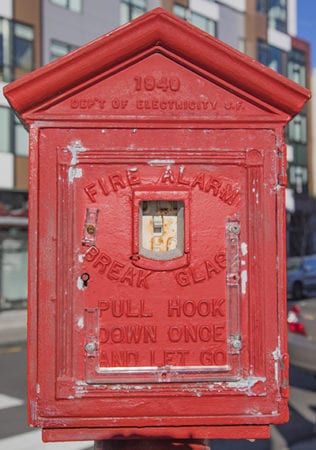 Once upon a time—in the mid-17th century to be precise—the fire alarm was invented. A few things differentiate the antiquated fire alarm to what most households use today. Namely, the original fire alarms were people. These individuals would walk around New York City, ringing bells to warn the community and were equipped with buckets to respond to fires. Unsurprisingly, they weren’t very efficient.
Once upon a time—in the mid-17th century to be precise—the fire alarm was invented. A few things differentiate the antiquated fire alarm to what most households use today. Namely, the original fire alarms were people. These individuals would walk around New York City, ringing bells to warn the community and were equipped with buckets to respond to fires. Unsurprisingly, they weren’t very efficient.
Early Beginnings of Fire Alarms
In 1852, Dr. William F. Channing and Moses Farmer designed the first fire alarm that wasn’t a person. The system comprised two fire alarm boxes with a telegraphic key and a handle. If someone cranked the handle, an operator at a nearby station would alert the fire department to go to the scene. Although this system was better than a human fire alarm, it still had significant drawbacks. The system’s most significant disadvantage was that people couldn’t waste time cranking a handle rather than running away from a fire.
Then in 1890, Francis Robbins Upton invented the first electrical fire alarm system. The system, although innovative for its day, was often overlooked. Notably, Upton didn’t work on the system alone; he received some help from his mentor, a man named Thomas Edison.
Modern Smoke Detectors and Fire Alarms
Duane Pearsall and Stanley Bennett Peterson created the first “modern” smoke detector in 1965. The battery-powered smoke detector called the “SmokeGard 700,” was made of fire-resistant steel. The SmokeGard 700 set the bar for future smoke detectors, especially after researchers determined that similar devices detected fires quicker than heat detectors.
Today, fire and smoke alarms are more advanced and last far longer than earlier designs. They’re far more effective, too. The batteries last longer, the detection is far more accurate, and they work automatically. Most importantly, they comply with the National Fire Alarm Code, a guideline for fire alarms and other fire codes.
Unfortunately, around 30% of fire alarm systems for commercial buildings do not work, usually because of aging or dead batteries. Which highlights just how important it is to regularly have your smoke detectors and fire alarms regularly inspected by professionals.
Speaking of modern fire alarms, you can view our Total Fire Protection Fire Alarms section to learn how can provide your company with the best available fire alarm systems for commercial buildings.





